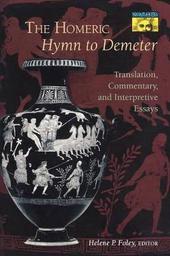
|
The Homeric Hymn to Demeter: Translation, Commentary, and Interpretive Essays
Paperback / softback
Main Details
Description
The Homeric "Hymn to Demeter", composed in the late seventh or early sixth century BCE, is a key to understanding the psychological and religious world of ancient Greek women. The poem tells how Hades, lord of the underworld, abducted the goddess Persephone and how her grieving mother, Demeter, the goddess of grain, forced the gods to allow Persephone to return to her for part of each year. Helene Foley presents the Greek text and an annotated translation of this poem, together with selected essays on its historical context and its religious, literary, social, and psychological meaning. The "Hymn" reflects both the crisis precipitated when marriage separates mother and daughter as well as the bonds that allow them to survive this transition. Demeter and Persephone, who suffered the pains of mortality, found the Eleusinian Mysteries that offered their male and female initiates a "different lot once dead in the dreary darkness." A version of the same myth formed the basis of exclusively female religious cults. The essays, contributed by Helene Foley, Mary Louise Lord, Jean Rudhardt and Nancy Felson-Rubin, Harriet M. Deal, Marilyn Arthur Katz, and Nancy Chodorow, give the reader a ric
Author Biography
Helene P. Foley is Olin Professor of Classics at Barnard College, Columbia University. She is author of Ritual Irony: Poetry and Sacrifice in Euripides, coauthor of Women in the Classical World: Image and Text, and editor of Reflections of Women in Antiquity.
Reviews"Foley synthesizes important insights of the articles she reprints and of much other scholarship besides, and builds on them to construct a comprehensive and persuasive reading of her own."--William G. Thalmann, Bryn Mawr Classical Review "Foley's book is the first full-length study in English of the Hymn... It is a welcome and much-needed work... Foley's analysis of the Hymn is an excellent demonstration of how it can be interpreted in the light of the [Eleusinian] Mysteries."--Ann C. Suter, New England Classical Newsletter and Journal "Foley's attempt to connect the psychological, cosmological, and theological themes in the Hymn is her greatest success."--Victoria Pedrick, The Classical Journal
|